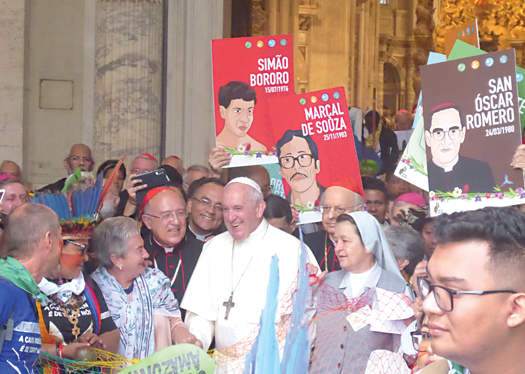
Pope Francis at this month’s Synod of Bishops for the Amazon, held at the Vatican. (Photo by Luis Miguel Modino, courtesy of REPAM)
Catholic bishops meeting at the Vatican this month called for an “ecological conversion” to combat the violence being done to the environment and the people of the Amazon region. In a 30-page document issued Oct. 26, the bishops asked the Catholic Church to embrace the concept of “integral ecology,” which intertwines care for the Earth with justice for those who are poorest and most disadvantaged.
The document, capping a three-week meeting held Oct. 6 to 27, addresses both internal church matters and issues related to care for the Earth, or what Pope Francis calls “our common home.” Its language sometimes borders on the poetic, but some parts are technical, and others are repetitive—a reflection of the fact input was gathered from multiple groups.
The document lists threats to indigenous people’s territories, including large infrastructure projects, industrial agriculture and illegal activities including wildcat mining, illicit logging and drug trafficking. “The depredation of territory is accompanied by the shedding of innocent blood and the criminalization of defenders of the Amazon,” the bishops wrote.
Although the region plays a crucial global climate role and provides water that sustains countless communities, “the Amazon today is a wounded and deformed beauty, a place of suffering and violence,” the bishops said.
The Coordinator of Indigenous Organizations of the Amazon Basin (Coica), an umbrella group of Amazonian indigenous organizations, issued a cautiously optimistic statement on the last day of the synod. When invited to the meeting, the group debated whether to send a delegate. But it participated, reasoning the pope could be an ally in taking on national authorities that do not respect indigenous territorial and other rights, Gregorio Díaz, general coordinator of Coica, said during the meeting.
Land-rights issue looms
Indigenous people attending the Synod of Bishops for the Amazon, as the meeting was formally known, as observers or guests described various threats to their territory. Above all, they asked church leaders to help them gain legal rights to their lands, given that uncertain land titling has caused ongoing friction—and sometimes violence—in the region. Studies show that indigenous territories are often the best-protected areas of the Amazon, as they provide a buffer against the razing of forests for pasture and cropland, the chief driver of South American greenhouse-gas emissions.
In calling for a “profound personal, social and structural conversion,” the bishops cited the need to cut greenhouse-gas emissions by abandoning fossil fuels and decreasing the use of plastics. Other recommendations included a call for church institutions to divest themselves of holdings in companies that commit environmental or human rights abuses.
At the root of the environmental crisis in the Amazon is an economic model that depends on rapacious extraction of resources, the bishops said. Although they acknowledged this model may not change quickly, they said the church must decide “whose side it is on,” and called for people in industrialized countries to adopt a simpler lifestyle.
Synod members also defined “ecological sin,” describing it as “sins of commission and omission against God, against one’s neighbor, the community and the environment.” Actions such as pollution and environmental destruction are sins against future generations, the bishops wrote.
Christiana Zenner, a theology professor at Fordham University in New York City, considers this to be among the document’s most important points. “It recognizes that ecological morality is a matter not just of intentional action, but also omissions, and the shape of our habits,” she said in an e-mail to EcoAméricas.
The final document echoed the indigenous peoples’ concerns, saying that the church must help defend territorial rights, especially for semi-nomadic groups that shun contact with wider society. Such groups are known to inhabit seven South American countries. The bishops also called on governments to respect indigenous people’s rights to free, prior and informed consent about projects affecting their collective rights. They warned against new forms of colonialism masquerading as development, offering a mea culpa for the church’s own abuses during the colonial era.
‘Bioeconomy’ plan pitched
Some participants worried that one proposal which was specifically described in the draft document, but mentioned only in passing in the final version, could open the door to another form of neocolonialism. The proposal, put forward in the synod by Brazilian climate scientist Carlos Nobre and U.S. economist Jeffrey Sachs, calls for using cutting-edge technology, such as biotechnology and drones, to help local communities add value to natural, non-timber products they gather from the forest.
Critics among the synod participants said the proposal was an effort to solve problems from the “top down,” and lobbied to keep the idea out of the final document. The word “bioeconomy” remained in the document, but is accompanied by caveats about giving indigenous people decision-making power over such projects and allowing them to choose what kind of development they want.
For its part, Coica in its closing-day statement called for “action, not words,” but also termed the synod “unprecedented” for allowing indigenous people to join such a meeting. “This pope invites humanity to live a simpler life and reminds us that the material world has not brought us happiness,” Coica said. “We have warned the bishops that they cannot save the Amazon alone, and we cannot continue to protect the forests without their aid.”
The final synod document offers recommendations to Pope Francis, who in his closing remarks to the bishops said he expects to prepare his response by the end of the year.
- Barbara Fraser
Index photo: Pope Francis said he expects to give his response to the synod’s recommendations by the end of the year. (Photo by Luis Miguel Modino, courtesy of REPAM)
The final synod document and the small-group reports it drew on are available at: link